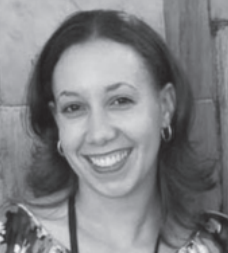
To tie in with this issue’s focus on scientific misconduct, Science Editor profiles a CSE member whose job is based in the prevention and correction of potential ethical breaches. Christina Bennett, PhD, is the publications ethics manager of the American Physiological Society (APS), Bethesda, Maryland.
Christina’s career path began at the University of Virginia, where she majored in biochemistry and minored in bioethics. Her science courses prepared her for graduate school, but she particularly enjoyed the philosophical and religious discussions in her bioethics classes. Christina believes that ideally scientists should have some training in bioethics.
After completing her studies in Virginia, Christina joined the Department of Molecular and Integrative Physiology of the University of Michigan. “I was always interested in how our bodies work,” she notes. In her doctoral studies, she used mouse models to examine obesity. She continued her research focus when she moved to the National Cancer Institute to use mouse models to study breast cancer.
A decade or so into her life as a researcher, Christina wanted to change her focus. She is a member of APS and saw an advertisement for ethics manager of the society’s publications. “It was as though [the position] was written for me,” she says. She joined the staff of APS in January 2011 as the publications ethics manager.
In her current position, Christina handles ethical issues that arise in the 13 journals that APS publishes. She fields questions and sometimes seeks expert opinions. Typical topics range from copyright issues, corrections, and plagiarism to screening for digital manipulation of images in all accepted manuscripts. She admits that when she applied for the job, she did not expect to encounter many cases. However, she notes, she did not fully appreciate the number of quality controls in place to protect both the authors and the publisher. Christina does not believe that most of the problems she sees are of malicious intent.
Christina is a relative newcomer to CSE, having joined just this year. However, she has “always wanted to teach a science and ethics course” and was able to do something similar at the 2012 CSE annual meeting. Christina was a faculty member of the Short Course on Publication Ethics and shared her perspective on image manipulation. She discussed such topics as how to check for digital manipulation, how to resolve problems that are identified, and what tools are available to help editors and journals to identify tampering. She feels that she not only contributed to the meeting but learned a lot by listening to others throughout the day. “It’s good to hear what others are doing; journals have different issues and different resources.” She was encouraged to hear that other editors face similar issues and are able to get together to share ideas.
Her science background is clearly vital in her role at APS, but equally important, Christina says, she has always had a strong interest in English and writing. “I’m a big reader; I always have a book in hand,” she notes. One of the other attractions of her job at APS has been the ability to gather more often with family, many of whom live in Maryland.
She enjoys walking, not only for exercise, but also as a means of catching up with friends, and she enjoys dance, having taken several years of jazz and funk dance classes in graduate school. Christina enjoys being on the beach; her recent vacation destinations have included the Bahamas and Aruba.
Christina finds her job rewarding, as she helps bring the highest quality possible to the society’s publications. But even though catching and correcting errors and ethical breaches is her charge, “I always remember that there are people behind these mistakes.”
STACY CHRISTIANSEN is director of manuscript editing at JAMA.
